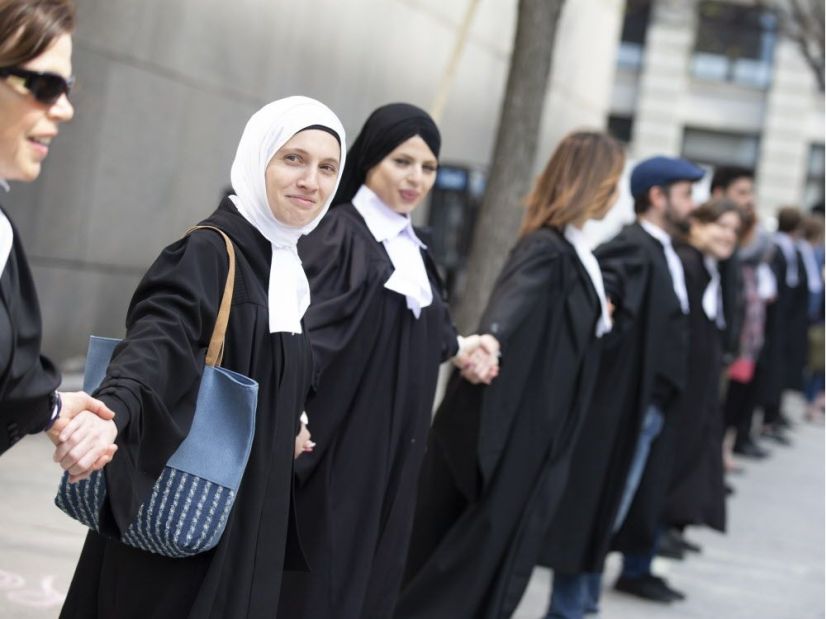Connexion
Dernières nouvelles
Crown attorneys call on Manitoba government to help address 'dangerously heavy caseloads'
The Manitoba Association of Crown Attorneys (MACA) is calling on the provincial government to help reduce mounting workloads that it says are making it difficult for prosecutors to meet their professional responsibilities. grievance it filed in April 2023. It says the grievance it filed back in April 2023 regarding 'dangerously heavy caseloads' won't be heard by an arbitrator until October 2025.
[ ...Suite ]Date de parution : 2025-01-10
Preparing RCMP body-cam evidence for court will be monumental task, prosecutor says
The RCMP is phasing-in the use of body-worn cameras across the country and expects 90 per cent of frontline members to be wearing them within a year. Shara Munn, president of the New Brunswick Crown Prosecutors Association, said while the body-camera evidence will be great to have, it will also mean a huge influx of work for prosecutors.
[ ...Suite ]Date de parution : 2025-01-06
N.L. government invests in 18 new Crown attorneys amid severe staffing crunch
Newfoundland and Labrador Justice Minister Bernard Davis announced Wednesday afternoon that the provincial government is investing nearly $24 million to improve the province's justice system.... The investment comes after CBC News reported in numerous stories that Crown attorneys in the province were "suffocating" from overwhelming workloads and a critical staffing shortage.
[ ...Suite ]Date de parution : 2024-11-14
Newfoundland to add more Crown prosecutors
Newfoundland and Labrador has agreed to hire more Crown lawyers following cries of a shortage of prosecutors in the province. The “multi-year investment” will include the hiring of 18 new Crown lawyers, according to a news release.
[ ...Suite ]Date de parution : 2024-11-13
Critical shortage of Crown attorneys has 'gone on way too long' and is hurting public safety
The Canadian Association of Crown Counsel, an umbrella group for thousands of Crown attorneys and government lawyers across the country is calling for a big boost in the number of provincial prosecutors in Newfoundland and Labrador.
[ ...Suite ]Date de parution : 2024-11-13
Most criminal cases in Ontario now ending before charges are tested at trial
More than half of the criminal charges laid by police in Ontario never make it to trial, according to data from Statistics Canada. The numbers paint a troubling picture of the province’s justice system. More judges, staff, prosecutors and courtrooms needed, says Crown attorneys’ association.
[ ...Suite ]Date de parution : 2024-11-12
<-- Retour au nouvelles archivées
Labour union blasts CAQ government during Bill 21 hearings
15-05-2019

A group of protesters, including lawyers and teachers, against Bill 21 formed a human chain in downtown Montreal, Quebec May 5, 2019. CHRISTINNE MUSCHI / MONTREAL GAZETTE
QUEBEC — One of the province’s largest labour unions did an about face Wednesday, saying Bill 21 condones prejudices and could lead to the ghettoization of Muslim women because they will not be allowed to work in certain government jobs.
In a stinging rebuke to the government on the second-to-last day of hearings into the proposed legislation, the Confédération des syndicats nationaux (CSN), which represents 300,000 workers including hundreds in the public sector, backtracked on its traditional position in favour of a ban on symbols for persons in authority.
The union now thinks a ban is a bad idea and will do nothing to make the government more secular.
In fact, the union testified, the government is playing a dangerous game that is already backfiring on the streets and on buses in the form of increased anti-immigrant behaviour and incidents.
“In worrying about religious symbols as does the bill, we are condoning prejudices against people who wear symbols and sowing doubt on their capacity (to work) in a professional manner, with neutrality, with integrity and ethics and not proselytizing,” CSN counsellor Marie-Hélène Bonin told the committee.
“One of the dangers we see is the ghettoization of certain communities or certain women who are sent back home,” added her union colleague Mireille Bénard. “Women who we see integrate and emancipate themselves might have to stay at home. What is really worrisome is the ghettoization of certain communities.”
“I hope the minister (Simon Jolin-Barrette) has been attentive to what you are saying,” responded the Québec solidaire MNA on the committee, Sol Zanetti, who sparked the comments with his blunt questions to the union.
It is shift for the union which, in the 2013 debate on the Parti Québécois’s defunct Charter of Quebec Values, took a stand in favour of the Bouchard-Taylor formula that would have slapped a ban on persons in authority such as judges, police officers and prison guards.
At the time, the CSN also argued in favour of expanding the ban to daycare workers and teachers.
But union president Jacques Létourneau told the committee times are changing and the new younger union membership does not see things the same way as the old generation. Immigrants and symbols are in their daily lives.
He also told the committee the bill unfairly targets Muslim women creating “a phenomena of discrimination” against them, while a Muslim man who has a beard for reasons of faith is not targeted because it is simply seen as a “hipster” symbol.
But the union warned of the long-term consequences of Bill 21.
In one paragraph of its brief, the union says “Introducing additional measures that discriminate against entry to the workplace will have the effect of creating a social fracture and resentment in thus marginalized communities for decades to come.”
The testimony comes as the committee winds down from two weeks of hearings. Thursday is the last day.
And while the association representing the province’s provincial police officers endorsed the bill the same as Montreal’s police fraternity has, lawyers and notaries working for the government poked holes in the bill.
They told the committee examining Bill 21 that the rules against religious symbols have to cover all of them or none. It’s a question of coherence.
Describing the issue of symbols as “marginal” among the hundreds of lawyers in the employ of the Quebec government, Marc Dion, president of Les avocats et notaires de l’État Québécois, said of his 1,267 members, between 600 and 700 are covered by the ban in the bill, 500 are not.
That means applying the bill presents special challenges for the judiciary, he added.
There could be situations in a courtroom where a lawyer working for the Régie du logement or the Quebec Human Rights Commission would not be allowed to wear a symbol, but a lawyer working for Revenue Quebec, l’Autorité des marchés financiers or Investissement Québec on the same case can.
And what happens when lawyers are called in to help a cabinet minister at a legislature committee? The lawyer from the finance department is barred from wearing a symbol, the one from revenue is not?
“We are all lawyers, there are just different fields of expertise,” Dion told the committee. “For us, it’s all or none. It’s a question of coherence.
Dion said in his view when a lawyer represents the state they have to be “impartial and neutral,” and appearances matter.
“What happens when someone who finds themselves refused an immigration certificate and sees that the lawyer who is representing the state … is of another faith? Objectively, certain people might say ‘he was against me because he does not have the same faith.’ ”
The committee also heard Wednesday from the Mouvement laïque Québécois, a civilian lobby group pushing for secularism. The group asked for the ban to be expanded.

